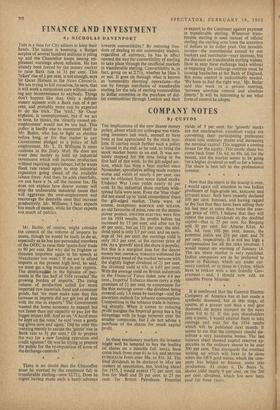COMPANY NOTES
By CUSTOS
Tim implications of the new dearer money policy, about which my colleague was warn- ning investors last week, seemed to have been at last appreciated by the stock mar- kets, If carried much further such a policy is bound in the end, as he said, to bring the stock market boom to an end. It was cer- tainly stopped for the time being in the first half of this week. In the gilt-edged sec- tion, which has been a bear market since November, speculative selling made matters worse and yields of nearly 4 per cent. can now be obtained from some dated stocks. Undated War Loan yields nearly 41 per cent. In the industrial share markets wide- spread falls were seen. Even the 'blue chips' did not stand up to 'yield competition' from the gilt-edged market. There were, of course, exceptions. BABCOCK AND WILCOX, an old favourite of mine, rose on the atomic power project. ENGLISH ELECTRIC were firm on its 1954 results. Its profits before tax increased by 15 per cent. and after tax by 40 per cent., but on 124 per cent. the divi- dend yield is only 3.7 per cent. and on earn- ings of 341 per cent. the earnings yield is only 10.3 per cent. at the current price of 68s. As a 'growth' stock the share is popular, but this is a marginal case for the dearer money test. IMPERIAL. TOBACCO withstood the downward trend of the market because with the slightly higher dividend of 21 per cent. the dividend yield at 63s. is 6.65 per cent. With the average yield on British industrials in the Financial Times index now 4.4 per cent., Imperial Tobacco shares carry a risk premium of 2+ per cent. to compensate for the thin earnings cover—the dividend being covered only 1.6 times by earnings—and the uncertain outlook for tobacco consumption. Competition in the tobacco trade is increas- ing sharply. When it comes to reducing profit margins the Imperial group has a big advantage with its huge turnover over the smaller companies, but I do not advise a purchase of the shares for much capital profit.
* *
yields of 5 per cent, for 'growth' stocks are not unattractive. CANADIAN EAGLE are converting their participating preference shares into ordinary shares and increasing the nominal capital. This suggests a coming bonus for the equity. This exotic share has come back from 53s. 6d. to 49s. 6d. for the hearer, and the market seems to be going for a higher dividend as well as for a bonus. The share is best left to the professional investor.
* * *
Now that the storm in the teacup is over, I would again call attention to two Indian producers of high-grade tea, BARGANG and ATI'AREE KIIAT. Both have recently declared 100 per cent. bonuses, and having regard to the fact that they have been selling their tea last year at more than twice the aver- age price of 1953, I believe that they will repeat the same dividends on the doubled capital—that is, 25 per cent. for Bargang and 30 per cent. for Attaree Khat. At 42s. 6d. cum 100 per cent, bonus, the potential yields are 234 per cent. and 28 per cent. respectively. It is not too high a compensation for all the risks involved. I
would repeat my warning of January 14. The tea share market is very restricted. Indian companies are to be preferred to those in Pakistan, which are under cur- rency control, or to those in Ceylon, which have to reckon with a less friendly Gov- ernment — and, I should now add, an irascible Prime Minister.
* * *
It is confirmed that the General Electric Company of America has at last made a synthetic diamond, but at this stage, of course, at a greater cost than a real gem diamond. DE BEERS slumped on the news from 611 to 5. If this puts shareholders into a panic, I would counsel them to take courage and wait for the 1954 results which will be published next month. It seems to me that the company should dis- tribute a very handsome bonus. The last balance sheet showed capital reserves ap- plicable to the ordinary shares to be over 500 per cent. This disregards the eventual writing up which will have to be done when the OFS gold mines, which the com- pany has helped to finance, come into production. At under 6, De Beers 5s, shares yield nearly 9 per cent. on the 200 per cent. dividend, which has now been paid for three years. .










































 Previous page
Previous page